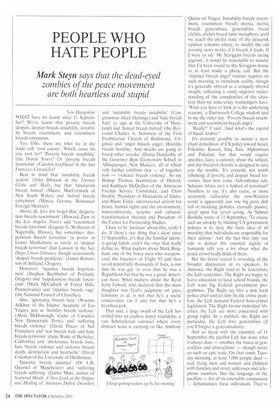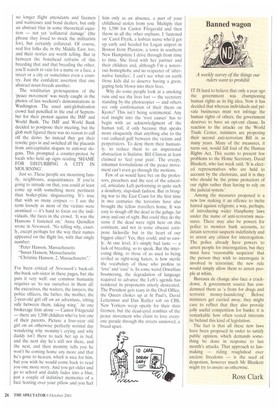PEOPLE WHO HATE PEOPLE
Mark Steyn says that the dead-eyed
zombies of the peace movement are both heartless and stupid
New Hampshire WHAT have we learnt since 11 September? We've learnt that poverty breeds despair, despair breeds instability, instability breeds resentment, and resentment breeds extremism.
Yes, folks, these are what we in the trade call root causes'. Which cause do you root for? 'Poverty breeds instability' (the Detroit News)? Or 'poverty breeds fanaticism' (Carolyn Lochhead in the San Francisco Chronicle)?
Bear in mind that 'instability breeds zealots' (John Ibbitson in the Toronto Globe and Mail), but that 'fanaticism breeds hatred' (Mauve MacCormack of New South Wales) and 'hatred breeds extremism' (Mircea Geoana. Romanian Foreign Minister).
Above all, let's not forget that `desperation breeds resentment' (Howard Zinn in the Los Angeles Times) and 'resentment breeds terrorism' (Eugene G. Wollaston of Naperville, Illinois), but sometimes 'desperation breeds terrorism' (a poster in Lower Manhattan) as surely as 'despair breeds terrorism' (Ian Lawson in the San Diego Union-Tribune), though occasionally 'despair breeds pestilence' (James Robertson of Ashland, Oregon).
Moreover, 'injustice breeds hopelessness' (Stephen Bachhuber of Portland. Oregon) and 'hopelessness breeds fanaticism' (Mark McCulloch of Forest Hills, Pennsylvania) and 'injustice breeds rage' (the National Council of Churches).
Also. 'ignorance breeds hate' (Wasima Alikhan of the Islamic Academy of Las Vegas). just as 'hostility breeds violence' (Alexa McDonough, leader of Canada's New Democratic Party). and 'suffering breeds violence' (David Pricco of San Francisco) and `war breeds hate and hate breeds terrorism' (Julia Watts of Berkeley, California) and 'intolerance breeds hate, hate breeds violence and violence breeds death, destruction and heartache' (David Coleman of the University of Oklahoma).
'Injustice breeds injustice' (Dr L.B. Quesnel of Manchester) and 'suffering breeds suffering' (Gabor Mate, author of Scattered Minds: A New Look at the Origins and Healing of Attention Deficit Disorder) and `instability breeds instability' (Congressman Alcee Hastings) and 'hate breeds hate' (a sign at the University of Maryland) and 'hatred breeds hatred' (the Reverend Charles A. Summers of the First Presbyterian Church of Richmond, Virginia) and 'anger breeds anger. Hostility breeds hostility. And attacks are going to breed other attacks' (Dania Dandashly of the Governor Bent Elementary School in Albuquerque, New Mexico), all of which only further confirms that — all together now — 'violence breeds violence'. So say Bishop Thomas Gumbleton of Detroit, and Kathleen McQuillen of the American Friends Service Committee, and Chris Struble, President of Humanists of Idaho, and Riane Eisler, international activist for peace, human rights and the environment, macro-historian, systems and culturaltransformation theorist and President of the Center for Partnership Studies.
I hate to be 'partisan' about this, really I do. If there's one thing that's clear since 11 September, it's that the familiar identity-group labels aren't the ones that really define us. What matters about Mark Bingham, one of the brave men who overpowered the hijackers of Flight 93 and thus saved potentially thousands of lives, is not that he was gay or even that he was a Republican but that he was a great American hero. What matters about the Revd Jerry Falwell, who declared that the mass slaughter was God's judgment on gays, feminists et al, is not that he's a social conservative (as I am) but that he's a heartless jerk.
That said, a large swath of the Left has settled into an endless dopey roundelay, a vast Schnitzlerian carousel where every abstract noun is carrying on like Anthony Quinn on Viagra. Instability breeds resentment, resentment breeds inertia, inertia breeds generalities, generalities breed clichés, clichés breed lame metaphors, until we reach the pitiful state of the peacenik opinion columns where, to modify the old evening news motto, if it breeds it leads. If I were to say `Mr Scroggins breeds racing pigeons', it would be reasonable to assume that I'd been round to the Scroggins house or at least made a phone call. But the 'injustice breeds anger' routine requires no such mooring to humdrum reality, though it's generally offered as a uniquely shrewd insight, reflecting a vastly superior understanding of the complexities of the situation than we nuke-crazy warmongers have. 'What you have to look at is the underlying reasons,' a Dartmouth College student said to me the other day. 'Poverty breeds resentment and resentment breeds anger.'
'Really?' I said. 'And what's the capital of Saudi Arabia?'
It's certainly possible to mount a trenchant demolition of US policy toward Israel, Palestine, Kuwait, Iraq, Iran, Afghanistan and Pakistan, but that would require specifics, facts, a curiosity about the subject, and this breed of rhetoric is designed to save you the trouble. It's certainly not worth rebutting: if poverty and despair breed terrorism, then how come Aids-infested subSaharan Africa isn't a hotbed of terrorism? Needless to say, it's also racist, or more accurately culturalist: the non-Western world is apparently just one big petri dish full of mutating globules, eternally passive, acted upon but never acting. As Salman Rushdie wrote of 11 September, 'To excuse such an atrocity by blaming US government policies is to deny the basic idea of all morality: that individuals are responsible for their actions.' And the fact that only one side is denied this essential dignity of humanity tells you a lot about what the peace crowd really think of them.
But the breed screed is revealing of the broader disposition of its speakers. In America, the Right tend to be federalists, the Left centralists. The Right are happy to leave education to local school boards, the Left want big Federal government programmes. The Right say hire a new local police chief and let him fix the crime problem, the Left demand Federal hate-crimes legislation. The Right favour individual liberties, the Left are more concerned with group rights. In a nutshell, the Right are particular, the Left love generalities (if you'll forgive a generalisation).
And so faced with the enormity of 11 September the pacifist Left has done what it always does — smother the issues in generalities and abstractions — though never on such an epic scale. On that sunny Tuesday morning, at least 7,000 people died — real, living men and women and children with families and street addresses and telephone numbers. But the language of the pacifists — for all its ostensible compassion — dehumanises these individuals. They're no longer flight attendants and firemen and waitresses and bond dealers, but only an abstract blur in some theoretical equation — not yet 'collateral damage' (the phrase they loved to mock the militarists for), but certainly collateral. Of course, real live folks die in the Middle East, too, and their stories are worth telling. But in between the bonehead refrains of this breeding that and that breeding the other, you'll search in vain for a name or a face, a street or a city or sometimes even a country. Just the confident assertion that one abstract noun breeds another.
The totalitarian grotesqueness of the 'peace movement' was nicely caught in the photos of last weekend's demonstrations in Washington. The usual anti-globalisation crowd had pencilled in the end of September for their protest against the IMF and World Bank. The IMF and World Bank decided to postpone their meeting, but the glob mob figured there was no reason to call off the demo. So instead they got their rewrite guys in and switched all the placards from anti-capitalist slogans to anti-war slogans. This prompted a counter-protest by locals who held up signs reading `SHAME FOR DISTURBING A CITY IN MOURNING'.
Just so. These people are mourning family, neighbours, acquaintances. If you're going to intrude on that, you could at least come up with something more pertinent than boiler-plate sloganeering. It's true that with so many corpses — I use the term loosely as most of the victims were atomised — it's hard to focus on the individuals, the faces in the crowd. 'It was the Hansons I fastened on,' Anna Quindlen wrote in Newsweek. 'No telling why, exactly, except perhaps for the way their names appeared on the flight list, with that single number:
"Peter Hanson, Massachusetts "Susan Hanson, Massachusetts "Christine Hanson, 2, Massachusetts":
I've been critical of Newsweek's back-ofthe-book sob-sister in these pages, but she puts it very well: our common humanity requires us 'to see ourselves in them all: the executives, the waiters, the lawyers, the police officers, the father, the mother, the 2-year-old girl off on an adventure, sitting safe between them, taking wing.' At one brokerage firm alone — Cantor Fitzgerald — there are 1,500 children who've lost one of their parents. Picture a four-year old girl on an otherwise perfectly normal day wondering why mommy's crying and why daddy isn't there to tuck her up in bed, and the next day he's still not there, and the next, and then mommy tells you he won't be coming home any more and that he's gone to heaven, which is nice for him, but you wish he would come back to read you one more story. And you get older and go to school and daddy fades into a blur, just a couple of indistinct memories of a face leaning over your pillow and you feel
him only as an absence, a part of your childhood stolen from you. Multiply that by 1,500 for Cantor Fitzgerald and then throw in all the other orphans. I 'fastened on' Carol Flyzik, a lesbian nurse who'd got up early and headed for Logan airport in Boston from Plaistow, a town in southern New Hampshire I drive through from time to time. She lived with her partner and their children and, although I'm a notorious homophobe and no respecter of 'alternative families', I can't see what on earth those kids did to deserve having a great, gaping hole blown into their lives.
Why do some people look at a smoking ruin and see the lives lost — the secretary standing by the photocopier — and others see only confirmation of their thesis on Kyoto? This isn't being sentimental. Any real insight into the 'root causes' has to begin with an acknowledgment of the human toll, if only because that speaks more eloquently than anything else to the vast cultural gulf between the victims and perpetrators. To deny them their humanity, to reduce them to an impersonal abstraction is Stalinist. Bill Clinton at least claimed to 'feel your pain'. The creepy, inhuman formulations of the peace movement can't even go through the motions.
Few of us would have bet on the professors, preachers and the rest of the educated, articulate Left performing in quite such a desultory, slap-dash fashion. But in bringing war to the East Coast for the first time in two centuries the terrorists have also brought the fellow travellers home. It was easy to slough off the dead in the gulags, far away and out of sight. But could they do the same if the dead were right here on this continent, and not in some obscure cornpone hicksville but in the heart of our biggest cities? Yes, they could, and so easily. At one level, it's simply bad taste — a lack of breeding, so to speak. But the interesting thing, to those of us used to being reviled as right-wing haters, is how sterile the vocabulary of those who profess to 'love' and 'care' is. In some weird Orwellian boomerang, the degradation of language required to advance the Left's agenda has rendered its proponents utterly desiccated. The President gets teary in the Oval Office, the Queen chokes up at St Paul's, David Letterman and Dan Rather sob on CBS, New Yorkers weep openly for their slain firemen, but the dead-eyed zombies of the peace movement who claim to love everyone parade through the streets unmoved, a breed apart.



































































































 Previous page
Previous page